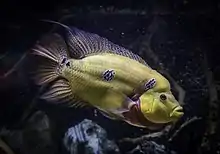| Three spot cichlid | |
|---|---|
 | |
| Trimac F1 male three spot | |
| Scientific classification | |
| Domain: | Eukaryota |
| Kingdom: | Animalia |
| Phylum: | Chordata |
| Class: | Actinopterygii |
| Order: | Cichliformes |
| Family: | Cichlidae |
| Subfamily: | Cichlinae |
| Tribe: | Heroini |
| Genus: | Amphilophus |
| Species: | A. trimaculatum |
| Binomial name | |
| Amphilophus trimaculatum | |
| Synonyms | |
The three spot cichlid (Amphilophus trimaculatum), also known as the trimac or red-eyed cichlid, is a species of cichlid from Mexico and Central America,[2] from the subfamily Cichlasomatinae. It is rarely found as an aquarium fish. Although still included as a highly aberrant member of Cichlasoma by FishBase,[2] other authorities such as Catalog of Fishes have moved it to the genus Amphilophus.[1]
Appearance
The three spot cichlid is a large heavy bodied cichlid. It has a green or yellow hue base with the distinct spots on its sides. The male is much larger than the female growing up to 15" he has longer more pointed fins and a large red spot behind his gills. The female is smaller growing up to 9-10" and a less dominant red spot. The male may also grow a nuchal hump when mature.[3]
Distribution and habitat
The threespot cichlid is found in slow flowing stretches in the lower river valleys of the rivers of the Pacific Slope of Central America from Mexico to Panama, where there is a muddy or sandy substrate. Here it is found among the roots and weeds.[2] It has been found as an introduced species in Florida and Nevada but these populations were extirpated,[4] and in Singapore.[5]
Biology
The three spot cichlid feeds mainly on small fishes and invertebrates, including both aquatic and terrestrial insects.[2] A large female may lay over 1,000 eggs and reach sexual maturity at a length of 8–10 centimetres (3.1–3.9 in), while for males this is attained at 12–14 centimetres (4.7–5.5 in).[2] The pair usually select a flat stone and spawn on that, both parents guard the eggs fiercely and will also tend the fry after they have hatched.[5]
In the aquarium
Trimacs cichlids are rarely found in the aquarium trade. It is thought that the three spot cichlid was used in the creation of the hybrid flowerhorn cichlid.[5]
References
- 1 2 Eschmeyer, William N.; Fricke, Ron & van der Laan, Richard (eds.). "Amphilophus trimaculatus". Catalog of Fishes. California Academy of Sciences. Retrieved 14 July 2019.
- 1 2 3 4 5 Froese, Rainer; Pauly, Daniel (eds.) (2019). "Cichlasoma trimaculatum" in FishBase. July 2019 version.
- ↑ "Trimac Cichlid". aquariacentral. Archived from the original on 6 June 2007. Retrieved 8 November 2018.
- ↑ "Cichlasoma trimaculatum (Günther, 1867)". Nonindigenous Aquatic Species. USGS. Retrieved 8 November 2018.
- 1 2 3 "Cichlasoma trimaculatum Three Spot Cichlid, Trimac". Seriously Fish. Retrieved 8 November 2018.
External links
- "Trimac Cichlid AKA Three-Spot Cichlid", www.aquariacentral.com, accessed July 24, 2008